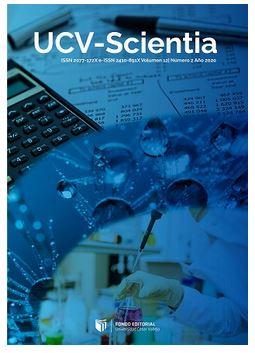Autonomous learning of the basic education student: A review bibliographic
DOI:
https://doi.org/10.18050/revucv-scientia.v15n1a6Keywords:
Autonomous learning, basic education, active learning.Abstract
The Autonomous learning It is the process that allows the student to be independent by building their own learning, having the freedom to choose their own strategy, to solve their problems and assume the consequences of their decisions, getting better their self-esteem. The objective of this research article, is to identify the importance of autonomous learning of the basic education student. Considering the methodology of bibliographic review, Primary sources of research found in databases of scientific publications such as: Scielo, Redalyc, Dialnet, and Google academic. Finding after the leak 26 investigations, whose articles were parameterized between 2019 and 2023, considered inclusion and exclusion criteria based on the PRISMA strategy that allowed to cover the expected profile. Concluding on the importance of autonomous learning in basic education students, because this type of learning will allow them to be prepared to face new challenges, in a changing and competitive world.
References
Aebli H. (2001). Factores de la enseñanza que favorecen el aprendizaje autónomo. Narcea, S.A. https://bit.ly/3XAGP2j
Aguilar Gordón, F. D. R. (2020). Del aprendizaje en escenarios presenciales al aprendizaje virtual en tiempos de pandemia. Estudios pedagógicos (Valdivia), 46(3), 213-223. http://dx.doi.org/10.4067/S0718-07052020000300213
Aliaga, C. E. (2022). Estrategias personalizadas para la enseñanza en educación básica: estudio de revisión. 593 Digital Publisher CEIT, 7(1), 332-342. https://doi.org/10.33386/593dp.2022.1-1.975
Carnone, S. Y. R. (2022). Las TIC en el aprendizaje en educación básica, una revisión sistemática. Revista Cientifica Emprendimiento Científico Tecnologico, (3), 13-13. https://bit.ly/3JHYeQR
Crispín Bernardo, M. L., Caudillo Zambrano, M. D. L., Doria Serrano, M. D. C., & Esquivel Peña, M. (2011). Aprendizaje autónomo. https://bit.ly/3D1tpmi
Dewey, J. (1933, ed. 1989). Cómo pensamos: Nuestra exposición de la relación entre pensamiento reflexivo y proceso educativo. (pp. 4-73). Paidós. https://bit.ly/3r9mu7T
Enríquez, V. L., & Hernández, G. M. (2021). Alumnos en pandemia: una mirada desde el aprendizaje autónomo. Revista digital universitaria, 2(22). http://doi.org/10.22201/cuaieed.16076079e.2021.22.2.11
Estacio-Chang, M. A., & Medina-Zuta, P. (2020). Rol del docente para la formación en investigación: reto pendiente de la educación peruana. Maestro y Sociedad, 17(2), 354-369. https://bit.ly/3XSQ8uJ
Fondo de las naciones unidas para la infancia (UNICEF 2019). Segundo año Taller de aprendizaje /proyecto 02 Autoevaluación y evaluación entre pares. https://uni.cf/3NE1cXF
Freire, P. (2004), Pedagogía de la autonomía. Paz e terra S.A. https://bit.ly/46CkRQi
Lip, L. C. A. (2022). Desarrollando autonomía en los niños a través del juego didáctico: Developing autonomy in children through educational game. Revista científica ecociencia, 9(1), 30-46. https://doi.org/10.21855/ecociencia.91.583
Loja, C. & Quito, L. (2021). El rol docente y las innovaciones pedagógicas como elementos para la transformación educativa. Revista Scientific, 6(20). https://doi.org/10.29394/Scientific.issn.2542-2987.2021.6.20.16.296-310
Luna, S. C. (2015). El futuro del aprendizaje 2 ¿Qué tipo de aprendizaje se necesita en el siglo XXI? Investigación y Prospectiva en Educación: contribuciones temáticas UNESCO, París (14). https://bit.ly/3PGRt5s
Mena Terry, M.A.T, & Ruíz Cumapa, M. (2022). Educación híbrida: alternativa para el aprendizaje autónomo de las matemáticas. Educación Y Sociedad, 20(3), 190–210. https://bit.ly/44sOfXB
Mendoza L. (2022). Las Tics como soporte en el aprendizaje autónomo en estudiantes de nivel secundario: retos a alcanzar en la educación digital. Ciencia Latina Revista Científica Multidisciplinar, 6(2), 1379–1406. https://doi.org/10.37811/cl_rcm.v6i2.1960
Ministerio de Educación (2016). Currículo Nacional de Educación Básica. https://bit.ly/3CZihGD
Ministerio de Educación (2021). Desarrollo de la autonomía de las y los estudiantes: brindar orientaciones generales a los docentes tutores sobre el desarrollo de la autonomía en sus estudiantes con el fin que sean gestores de su propio aprendizaje. Repositorio MINEDU. https://bit.ly/3rjxoYJ
Monteza, D. (2022). Estrategias didácticas para el pensamiento creativo en estudiantes de secundaria: una revisión sistemática. Revista Innova Educación, 4(1), 120-134. https://doi.org/10.35622/j.rie.2022.01.009
Moreira, M. K.M., Marín, L. R. M., & Vera, V. L. (2021). La educación de la autonomía en niños y niñas del subnivel inicial 2 de la escuela Gabriela Mistral. Polo del conocimiento, 6(8), 135-153. https://bit.ly/3NI2Rvu
Ñontol Oyarce, L. M., Montenegro Marín, M. R., Ruíz Acuña, H. M., & Fernández Otoya, F. A. (2022). El design thinking como metodología para desarrollar el aprendizaje autónomo en estudiantes de escuelas peruanas. Revista San Gregorio, 1(51), 209-230. https://bit.ly/3XCXS3w
Organización de las Naciones Unidas para la Educación, la Ciencia y la Cultura [UNESCO]. (2022). Reimaginar juntos nuestro futro: un nuevo contrato social para la educación. https://bit.ly/44w6ECU
Quiquije, L. A. L., & Flores, A. (2022). Guía de actividades lúdicas que fomenten la autonomía en los niños de Educación Inicial II. Revista Educare-Upel-IPB-Segunda Nueva Etapa 2.0, 26(Extraordinario), 215-235. https://doi.org/10.46498/reduipb.v26iExtraordinario.1704
Rodríguez, T. Á. F., Chicaiza, P. L. E., & Cusme, T. A. C. (2022). Metodologías emergentes para la enseñanza de la Educación Física (Revisión). Olimpia, 19(1). https://bit.ly/46uD2HX
Ruiz, B. E., Escudero, N. A., & Mercado, L. E. P. (2022). Evaluación del aprendizaje autónomo dentro del aula invertida: revisión sistemática. Voces de la educación, 7(14), 143_168-143_168. https://bit.ly/3JJhqgY
Ruiz, H.D. & Ortega-Sánchez, D. (2022). El aprendizaje basado en proyectos: una revisión sistemática de la literatura (2015-2022). Revisión humana. International Humanities Review/Revista Internacional de Humanidades, 11 (Monográfico), 1-14. https://doi.org/10.37467/revhuman.v11.4181
Ulloa, O. A. (2022). Desarrollo de capacidades investigativas en estudiantes de educación básica: estudio de revisión. 593 Digital Publisher CEIT, 7(4), 114-128. doi.org/10.33386/593dp.2022.4.992. https://doi.org/10.33386/593dp.2022.4.992
Downloads
Published
How to Cite
Issue
Section
License
Copyright (c) 2023 Adriana Maritza Peralta Macedo

This work is licensed under a Creative Commons Attribution 4.0 International License.
- Share — copy and redistribute the material in any medium or format
- Adapt — remix, transform, and build upon the material.
- The licensor cannot revoke these freedoms as long as you follow the license terms.
Under the following terms:
-
Attribution — You must give appropriate credit, provide a link to the license, and indicate if changes were made. You may do so in any reasonable manner, but not in any way that suggests the licensor endorses you or your use.
- No additional restrictions — You may not apply legal terms or technological measures that legally restrict others from doing anything the license permits.













